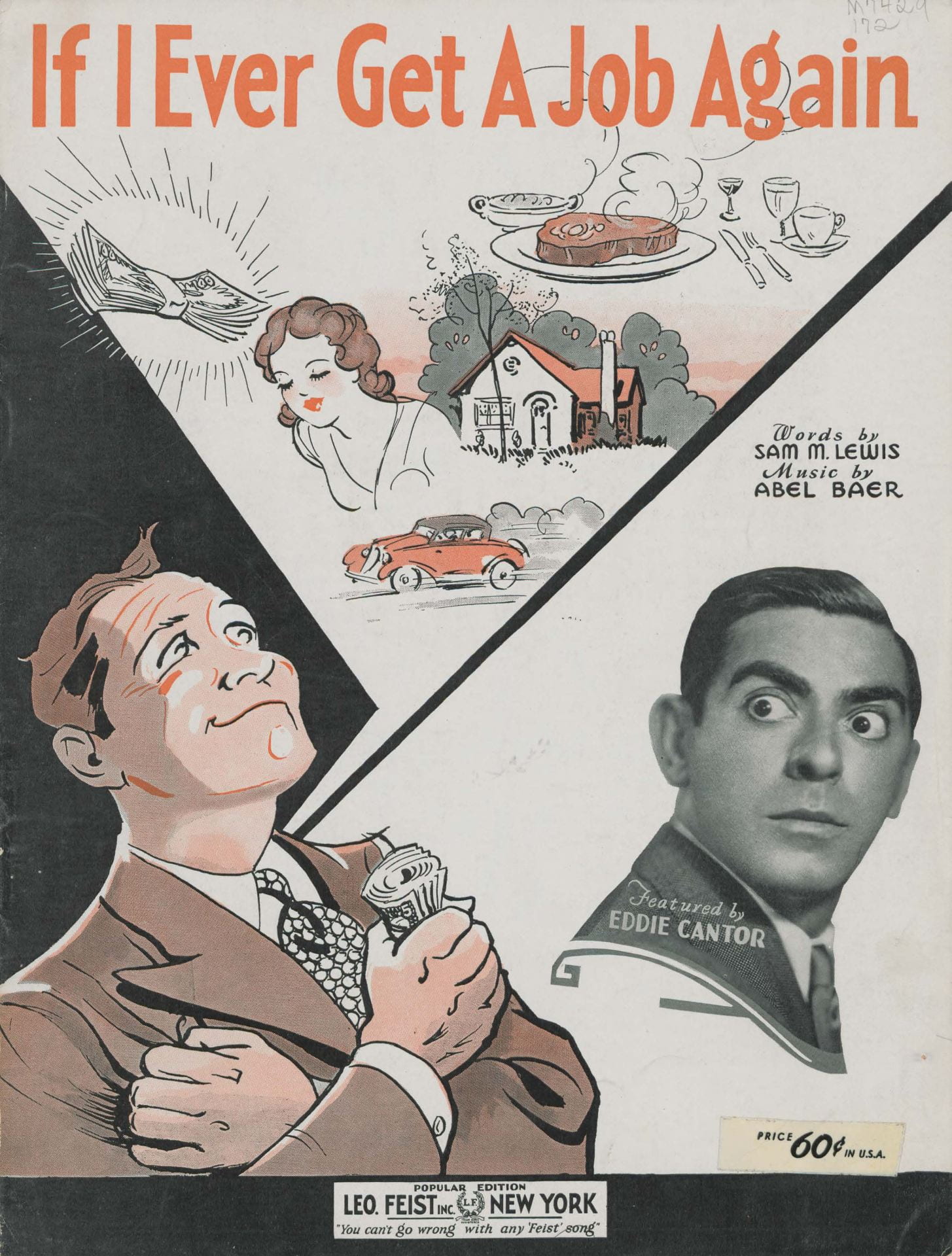What does music research look like? This is the eighth post in a series that highlights music research by students in a Baylor School of Music class taught by Dr. Laurel Zeiss, a recipient of the 2022 Special Collections Teaching Fellowship. These students worked beyond traditional research and learned how to engage with primary sources in the Baylor Libraries’ Frances G. Spencer Collection of American Sheet Music. Enjoy exploring this unique collection through our new scholars’ works.
If I Ever Get a Job Again by Abel Baer
by Christopher Thompson
“If I Ever Get a Job Again”, published in 1933 in New York City, is an ode to better times, intended for hearts wearied by the turmoil of the Great Depression. The front cover alone captures a sense of nostalgic reminiscence as a business-dressed gentleman reflects on a forgotten American idyll. A quaint family home is ringed around by a heaping portion of steak, a fueled-up car, and a doting woman: altogether, promises of excess, freedom, and the good life. Most prominent among these is a shining bundle of hundred-dollar bills, contrasting the wad of fives clutched in the man’s hopeful hand. All of this speaks the spirit of the time, looking backward as a dream of what is to come. The wide-eyed figure of one Eddie Cantor is also featured alongside the sanguine cartoon as a recognizable eye-draw, just as modern pop stars are plastered across the covers of grocery-line magazines.
This tune is a fox-trot, meant as accompaniment for a ballroom dance characterized by its ‘trotting’ walking step. The influences of ragtime are evident in the jaunty, syncopated vocal line and accompaniment. Interestingly, alongside the singer and piano accompaniment, there is notation for ukulele—a strange musical choice at first glance. However, in difficult times when a home piano—or even a cheaper alternative, such as a guitar—might be financially infeasible, the small, inexpensive ukulele could prove a reasonable choice for the aspiring crooner. Of course, it is the lyrics of the tune which speak its message most clearly, visual interpretation and reading- done-between-the-lines aside. The recurring theme— “If I ever get a job again” —is extended as a hand offering to shake on a business deal. The singer, in their longing, seeks to strike a bargain: with God, with corporate America, with whoever would listen and make things ‘right’. In return, they offer the attitude of a perfect, uncomplaining worker; they “will never be a snob again.” The life of the worker is idealized, but even more-so the benefits which accompany such a life. Promises to “punch the clock at eight / (And if the boss says ‘late’—it’s late)” give way to dreams for new suits, a ‘comf’tably’ furnished house, and “rehearsing lullabies.” It is altogether a capitalist’s prayer, spelled out in six unique choruses. After all, without a job, what I there to do but sing?
It is difficult to identify with the materialistic view put forth in this sheet music, particularly as the lyrics paint a very poor picture of character. They promise, “I’ll check up on the list, / Of all the Mammas that I’ve missed” and admit, “If I ever a job again, / From the Missus I won’t rob again.” At the time, such ideas may have been socially acceptable, but now, it comes off as antiquated and, frankly, pretty slimy. Nonetheless, the song is one of catharsis and hope. We heard echoes of the same cry during the pandemic as millions of laid-off workers struggled to make ends meet—again resounded “If I ever get a job again…I’ll never sing no more, / ‘Landlord, Oh! stay way from my door.’” The strains of this music persist in the air around us, even a near-century later. Thus, we see in this tune reflected the spirit of the American dream—a persistent, hopeful push towards greener pastures and brighter horizons where—yes, praise be to God! —we have got a job again!
Bibliography
- Ambalal, Monica F. “Cantor, Eddie.” Grove Music Online. 16. Oxford University Press. Date of access 13 Nov. 2022, https://www-oxfordmusiconline-com.ezproxy.baylor.edu/grovemusic/view/10.1093/gmo/9781561592630.001.0001/omo-9781561592630-e-1002248789.
- Lewis, Sam M. and Baer, Abel. “If I Ever Get a Job Again.” Merit Publication Co., 1932.
- Conyers, Claude. “Foxtrot.” Grove Music Online. Oxford University Press. Date of access 13 Nov. 2022,https://www-oxfordmusiconline-com.ezproxy.baylor.edu/grovemusic/view/10.1093/gmo/9781561592630.001.0001/omo-9781561592630-e-1002219055.
- Romer, Christina D. and Pells, Richard H. “Great Depression.” Encyclopedia Britannica, 23 Aug. 2022, https://www.britannica.com/event/Great-Depression. Accessed 27 October 2022.
- Walsh, Thomas J. “Ukulele.” Grove Music Online. 31. Oxford University Press. Date of access 13 Nov. 2022, https://www-oxfordmusiconline-com.ezproxy.baylor.edu/grovemusic/view/10.1093/gmo/9781561592630.001.0001/omo-9781561592630-e-1002257430.
